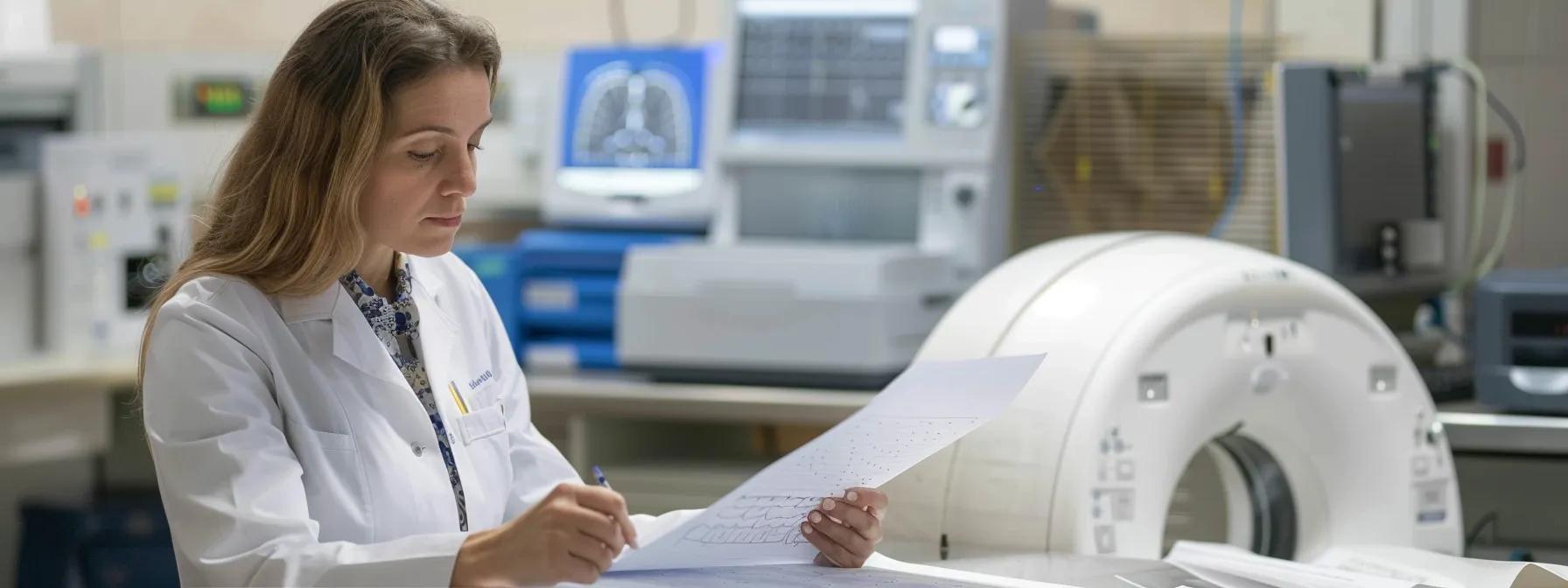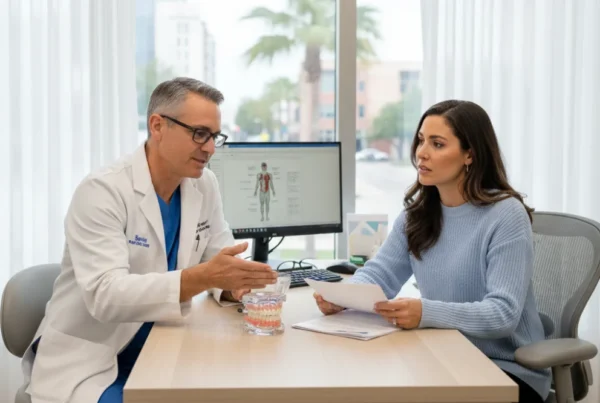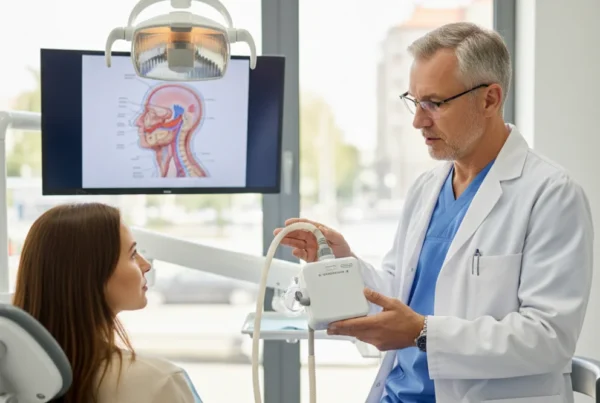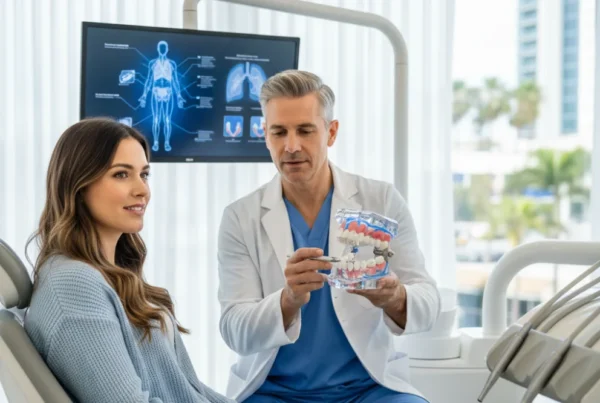Why a Sleep Apnea Specialist Should Be the First Step in Your Sleep Health Journey
Sleep apnea is not just a sleep problem—it’s a systemic health condition that affects every part of your body and quality of life. Poor oxygenation during sleep can contribute to chronic fatigue, weight gain, high blood pressure, memory loss, and even heart disease. And because symptoms often go unnoticed or misattributed, many people remain undiagnosed or improperly treated for years. This delay in care can erode long-term health and create an uphill battle once treatment finally begins.
Working with a sleep apnea doctor specialist from the start is critical for setting the right course. These professionals have dedicated training in sleep medicine and are often dual-certified in pulmonary, neurological, ENT, or internal medicine specialties. They go beyond general assessments by interpreting sleep data with nuance, detecting both obvious and subtle forms of sleep-disordered breathing, and crafting highly customized care plans that evolve over time.
Most importantly, sleep specialists understand that one size doesn’t fit all. Rather than defaulting to the most common therapies, like CPAP, they explore all available treatment modalities—including oral appliances, positional therapy, and surgical interventions—based on your specific anatomy, medical history, and preferences. It’s this comprehensive, patient-first approach that turns diagnosis into true transformation.
Precision Diagnosis: Why Sleep Testing Is Only the Beginning
Diagnosis is the foundation of any sleep apnea treatment plan, and getting it right is the most critical first step. A sleep specialist begins with a full review of your sleep history, symptoms, family risk factors, and current health conditions. They’ll also assess for common but overlooked signs like jaw tension, daytime headaches, and difficulty concentrating, all of which may point to interrupted breathing during sleep.
Next comes the clinical sleep study. Depending on your risk profile and insurance, this might be an at-home sleep apnea test (HST) or an in-lab polysomnography. Specialists know when one test is sufficient—and when more robust testing is needed to capture REM-specific events, central apneas, or other nuanced abnormalities. A detailed sleep study will measure your breathing, oxygen levels, brain activity, heart rate, and limb movements to help the doctor understand both the type and severity of your condition.
But diagnosis doesn’t stop with data collection. Once the test results are reviewed, your doctor will calculate your Apnea-Hypopnea Index (AHI), assess your oxygen desaturation patterns, and interpret how these disruptions impact your overall health. Based on these findings, they’ll assign a diagnosis—such as obstructive, central, or complex sleep apnea—and begin forming a treatment plan that fits your individual case.
Custom Treatment Planning: One Size Does Not Fit All
After diagnosis, the next step is creating a tailored treatment plan. This is where a sleep apnea specialist’s expertise makes a real difference. While general practitioners may recommend CPAP for everyone, specialists take a more nuanced approach. They evaluate your sleep data, physical structure, comorbidities, and lifestyle to determine which options will be effective—and which ones you’re likely to tolerate.
For moderate to severe obstructive sleep apnea, CPAP is often the first line of treatment due to its high efficacy. But many patients find it uncomfortable, inconvenient, or incompatible with travel or daily use. A sleep apnea specialist can identify early signs of CPAP intolerance and present alternative options, including oral appliance therapy, positional therapy, or weight-related interventions. These options can be equally effective when matched to the right patient.
The best specialists also understand the importance of shared decision-making. They involve you in every step of the process, explaining the pros and cons of each treatment option in plain language. They help you understand how your anatomy, health goals, and even your personal preferences factor into the equation. With this personalized roadmap, you’re more likely to commit to treatment—and more likely to succeed.
Collaboration Across Disciplines: Why Team-Based Treatment Works
Sleep apnea is rarely a solo issue. It often coexists with high blood pressure, Type 2 diabetes, TMJ, and sinus blockages. That’s why specialists don’t work in silos. Instead, they collaborate with dentists, ENTs, cardiologists, and other providers to build multidisciplinary care plans that address every angle of the condition.
For example, if you’re unable to tolerate CPAP, a sleep specialist may refer you to a dental sleep medicine provider for a custom oral appliance. These devices reposition the jaw or tongue to keep the airway open during sleep. At Beverly Hills Aesthetic Dentistry, we work directly with board-certified sleep doctors to ensure that each appliance is properly prescribed, tracked, and adjusted over time.
ENTs may be brought in when structural issues—like deviated septums or enlarged tonsils—need to be surgically addressed. Cardiologists and internal medicine providers can help manage related conditions like hypertension or atrial fibrillation. With everyone on the same page, your treatment becomes more than reactive—it becomes holistic and preventive.

Long-Term Monitoring and Lifestyle Integration
Sleep apnea is not a “set it and forget it” diagnosis. Effective care involves regular follow-ups, progress tracking, and the flexibility to make adjustments as your needs evolve. The best sleep apnea doctors know this and build long-term care into their process. After treatment begins, you can expect periodic check-ins to monitor symptom relief, evaluate treatment tolerance, and make changes as needed.
These follow-ups may include CPAP machine data downloads, oral appliance titration checks, or repeat sleep testing if your symptoms return. In many cases, therapy that once worked perfectly may need to be modified due to weight changes, aging, or new health developments. Having a specialist who tracks these metrics ensures your treatment stays effective—and that minor issues don’t become major setbacks.
In addition to clinical adjustments, lifestyle integration is key. Sleep specialists may offer coaching on sleep hygiene, dietary changes, and stress management. They’ll support you in building habits that improve not only your apnea, but your overall wellness. It’s this continuous partnership that helps patients achieve lasting results—and true quality of life improvements.
Consulting Services That Empower Practices and Patients
Sleep apnea specialists don’t just help patients—they help other providers elevate their standard of care. For medical and dental practices looking to offer sleep services, consulting plays a crucial role in developing the infrastructure needed to screen, diagnose, and co-manage patients effectively.
Consultants like Ohl Practice Consulting provide everything from team training and billing setup to clinical protocol development and case collaboration. This kind of expert support ensures that practices don’t just add sleep services as an afterthought—they build systems that are sustainable, scalable, and clinically sound.
For patients, this means better access to care. More providers become equipped to recognize the signs of sleep apnea early, refer to the right specialist, and offer complementary treatment like oral appliance therapy. When consulting and training are done right, the entire patient journey—from diagnosis to follow-up—is improved, and more people get the life-changing help they need.
What to Expect During a Sleep Apnea Consultation
If you’ve never met with a sleep apnea specialist, your first visit might feel like a big step—but it’s designed to be empowering. You’ll start by reviewing your sleep symptoms in detail, from snoring and choking during sleep to daytime drowsiness and concentration issues. The provider may ask about your stress levels, lifestyle, and any medications that could be affecting your sleep cycle.
Next comes the physical evaluation. The doctor may look at your airway, tongue, jaw alignment, and nasal passages. These structural features offer insight into what may be causing airway obstruction and help the doctor determine whether additional testing is needed. If you haven’t already had a sleep study, one will be ordered at this stage.
Before you leave, you’ll be briefed on what happens next. The provider will explain how your sleep test will be conducted, what the results will measure, and when you can expect follow-up. You’ll also be introduced to potential treatment paths—without pressure to commit. The goal of this visit is to leave you feeling informed, seen, and supported as you take control of your sleep health.
Final Thoughts: Your Sleep Deserves a Specialist
Treating sleep apnea effectively requires more than equipment—it requires expertise. A board-certified sleep specialist offers not just treatment, but transformation. They connect the dots between your symptoms and your long-term health, offer multiple pathways to success, and work with a team to make sure no stone is left unturned.
At Beverly Hills Aesthetic Dentistry, we believe in partnering with these experts to provide fully integrated, patient-first care. Whether you’re just beginning to explore symptoms or have tried CPAP and want alternatives, we’ll help you find the right specialist—and the right solution—for your needs.
Sleep apnea treatment is not a solo act. With the right team behind you, it becomes a path to greater energy, better health, and a fuller life.
Don’t let uncertainty hold you back. Schedule a consultation today and start building a thriving dental sleep practice with Ohl Consulting!
Ohl Practice Management & Consulting
connect@ohlpracticeconsulting.com
FAQs
Who should see a sleep apnea specialist?
Anyone experiencing chronic fatigue, loud snoring, waking up gasping, or morning headaches should consult a sleep apnea specialist. Individuals with risk factors like obesity, high blood pressure, or a family history of sleep disorders also benefit from proactive evaluation. Even mild symptoms can be signs of more serious underlying issues—and early intervention leads to better outcomes.
What should I expect from my first visit?
Your initial consultation will include a review of your sleep habits, daytime symptoms, and medical history. The specialist may perform a physical exam and recommend a sleep study to confirm the diagnosis. Before leaving, you’ll receive a personalized plan outlining next steps and options for care. The entire process is collaborative and designed to make you feel confident in your journey.
How do sleep specialists collaborate with other healthcare providers?
Sleep specialists often coordinate with dentists, ENTs, cardiologists, and primary care physicians to ensure comprehensive treatment. This collaboration allows for more accurate diagnoses, alternative therapies like oral appliances, and better management of comorbidities like hypertension or metabolic disorders. It’s a whole-person model designed to support long-term success.
Related Articles
Sleep Disorders Apnea, Apnea Solutions, Holistic Apnea Solutions, Understanding Sleep Disorders, Sleep Apnea Experts, Sleep Apnea Care, Sleep Quality, Sleep Apnea Doctor Specialist





